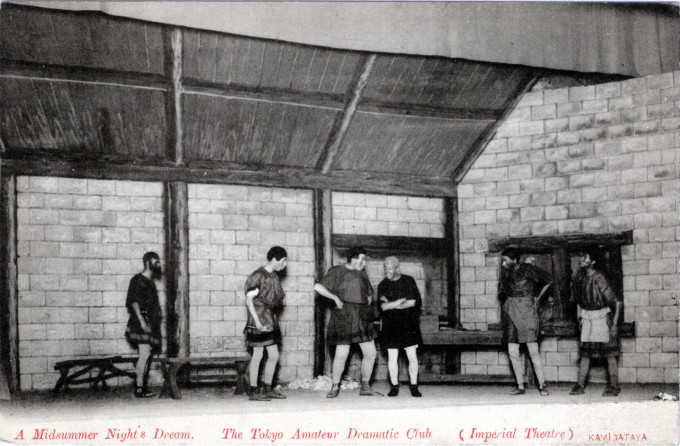“As a child, I often heard my parents talk about Kei Kurosawa’s Madrigal Society, as well as the Amateur Dramatic Club, in which their friend Mrs. de Havilland (mother of the film stars Olivia de Havilland and Joan Fontaine) use to shine. I was delighted to see both groups in full post-war swing, and joined them.
“In all the foreign communities clubs spring up which are by their nature designed only for the foreigners: those of one nationality or perhaps of one language. That was where the Tokyo Amateur Dramatic Club came in, uniting the British with, overwhelmingly, the Americans and other Anglophones.
“The standard was quite high. I wrangled myself a small part, but was not asked a second time. I had to rehearse a scene between one of the twins in Twelfth Night (me) and the sea captain.”
– Japan Experiences – Fifty Years, One Hundred Views: Post-War Japan Through British Eyes, 1945-2000, by Hugh Cortazzi, 2013

“A Midsummer Night’s Dream”, performed by the Tokyo Amateur Dramatic Club at the Imperial Theatre, Tokyo, c. 1910.
“February 10, 1896 marked the first general meeting of the Tokyo Dramatic and Musical Association – later known as the Tokyo Amateur Dramatic Club and, today, as Tokyo International Players (TIP). The group was formed at the original Imperial Hotel, Tokyo. Prominent among the roughly hundred people in attendance were the Chief of Mission of Belgium, Baron Albert D’Anethan, and his wife, the Baroness, who was one of the committee of nine Japanese and European men and women voted into office. The first committee meeting was held the following week at the Belgian Legation.
“A Lesson in Love, by Charles Smith Cheltnam, was the Tokyo Amateur Dramatic Club’s first production, with support from the Imperial House of Japan. Opening night was November 6, 1896. The theater was a university hall, and audience members arrived by rickshaw.
“The family of Academy-award winning actress sisters Olivia de Havilland and Joan Fontaine, (both born in Tokyo), were active in the Club. Their mother, Lilian Augusta Ruse (Lillian Fontaine), appeared in several productions, including the Arabian-Nights-themed drama Kismet in 1917.
“In the period leading up to the Pacific War, Japanese authorities insisted on inspecting detailed translations of every play. By 1940, TADC was declared an espionage center and forced to disband. War-time bombings destroyed any records of the Tokyo Amateur Dramatic Club.
“The Club was reorganized after the war when the Occupation forces made theaters available. ‘Procurement demands’ ensured facilities for set construction and professional painting. In April 1949, the curtain rose on two one-act plays, Miss Fingernail, by Beryl Kent, and Hecuba, by Euripides. Social traditions resumed, and opening nights, certainly until the early 1960s, were black-tie occasions.”
“The Frank Lloyd Wright-designed Imperial Hotel, Tokyo, one of the few buildings in Tokyo to withstand the 1923 Great Kantō earthquake, had an intimate theater which hosted the club until the early 1960s. Most performances of the Tokyo International Players from 1974 to 2007 were then staged in the Grand Ballroom of the Tokyo American Club.
“Currently, TIP uses several professional theater spaces in the Tokyo metropolitan area including Theater Sun-mall in Shinjuku, Ebisu Echo Theater, Pocket Square in Nakano, and Our Space in Hatagaya. Rehearsals are held at various venues around Tokyo.”
– Wikipedia

